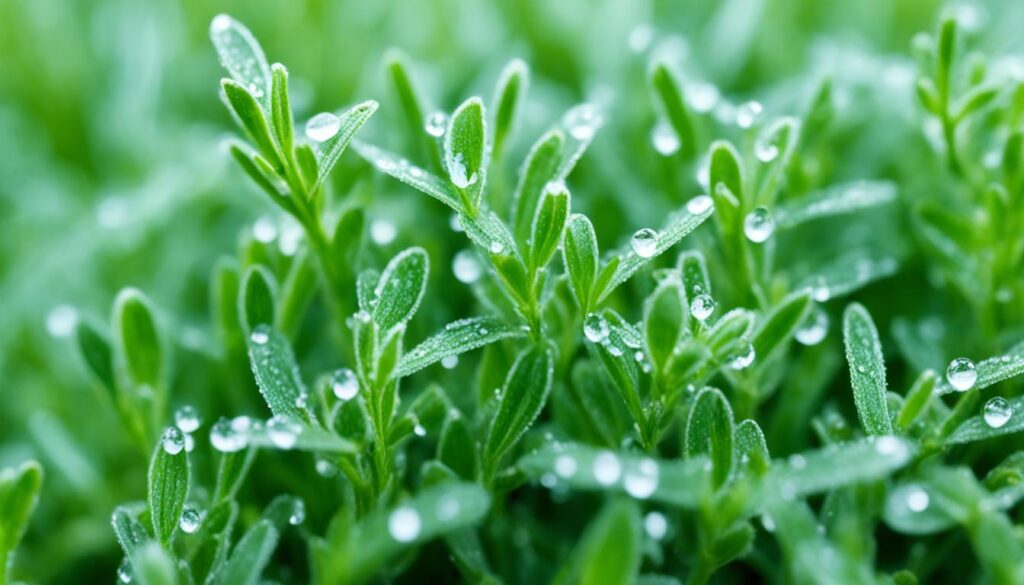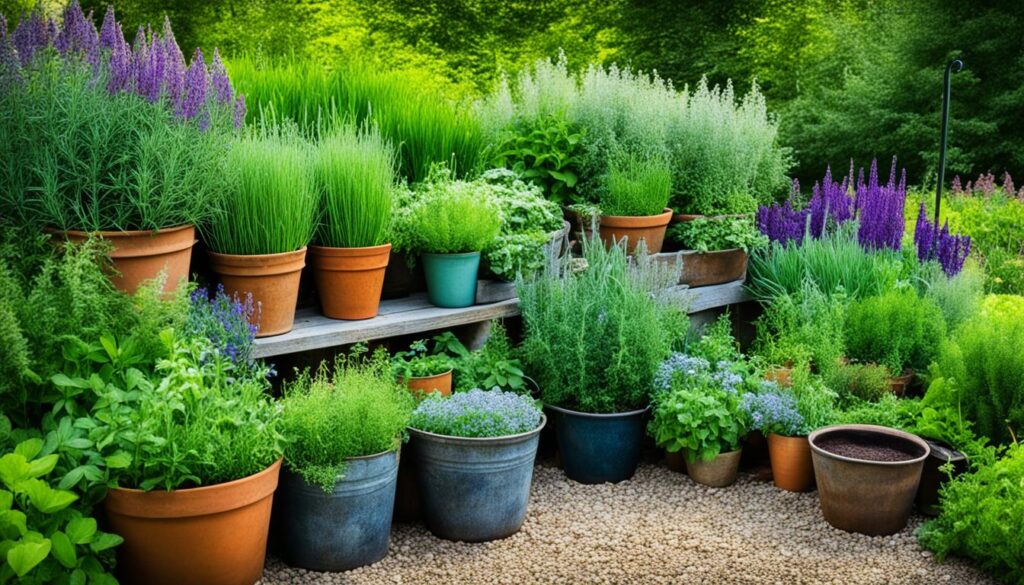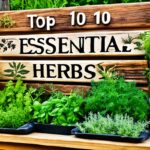Top 10 Essential Herbs for Your Garden and Their Uses
Want to boost your cooking skills and turn your garden into a lively spot of tasty herbs? You’re in the right place! Herb gardens are simple to maintain and very rewarding. They give you a lot of fragrant leaves that can make any dish better. Whether you’re a pro in the kitchen or just starting, learning to grow and use fresh herbs can change the game. But where do you start?
In this detailed guide, we’ll look at the top 10 essential herbs for your garden. We’ll also cover their many uses in cooking and medicine. From the best herbs to grow for beginners to the most useful herbs for experts, we’ve got everything you need. Get ready to learn how to grow culinary herbs and versatile herbs that will take your cooking to the next level and improve your health.
Key Takeaways
- Herb gardens offer an easy and rewarding way to grow your own fresh, flavorful ingredients.
- Mastering the art of growing and using herbs can transform your cooking and overall well-being.
- This guide will explore the top 10 essential herbs for your garden and their diverse culinary and medicinal applications.
- Whether you’re a beginner or a seasoned gardener, you’ll learn the best herbs to grow and how to use them to their fullest potential.
- Discover the secrets to cultivating a thriving herb garden and unlocking the versatility of these aromatic plants.
Introduction to Culinary Herbs
Easy herbs for beginners like culinary herbs are great to grow. They add flavor to many dishes and need little care. This makes them perfect for both new and experienced gardeners. Growing your own culinary herbs at home has many benefits.
The Benefits of Growing Fresh Herbs at Home
Having fresh herbs for your garden is a big plus for cooks. It makes them feel like pros when they use these herbs. Plus, you always get the freshest, tastiest herbs for your cooking.
Tips for Beginner Herb Gardeners
- Start with easy herbs for beginners like basil, mint, or chives. They grow fast and are easy to care for.
- Choose a spot in your garden or on your patio that gets at least 6 hours of sunlight daily. Herbs for your garden love the sun.
- Take care of your herb garden essentials. Use well-draining soil and water them regularly to keep them healthy.
- Try growing growing culinary herbs you use often in your cooking. This will make your meals even better.
With a little care, you can create a beautiful herb garden. It will make your cooking better and give you fresh herbs all year.
Basil: The King of Summer Herbs
Few herbs are more linked to summer than basil. It’s a favorite in many cuisines, especially in Italian cooking. You’ll find it in sauces and salads. This top kitchen herb is essential for any herb garden.
Growing and Caring for Basil Plants
Basil is a delicate culinary herb that doesn’t last long in cooking. Keep it in a small pot on your porch and cut it often to stop it from seeding. To keep fresh-cut basil, put the stems in a jar with water, and cover it with a plastic bag.
Culinary Uses of Fresh Basil
Add basil to salads for a burst of summer taste. It’s great with tomatoes, fresh mozzarella, and olive oil for a caprese salad. Or, mix it with olive oil and pine nuts for homemade pesto. Its unique flavor makes it a key cooking herb for many dishes.
“Basil is the king of garden herbs – its bright, peppery flavor is a must-have for any home cook.”
Rosemary: An Aromatic Evergreen Delight
Looking for the best herbs for your garden? Rosemary is your answer. This evergreen herb is a favorite among cooks for its unique, piney flavor. It’s been used for centuries in cooking, perfumes, and personal care products.
Rosemary is versatile and strong. Unlike delicate herbs like basil, it can handle long cooking times. It’s perfect for soups, stews, roasts, and more. Plus, it’s easy for beginners to grow indoors or outdoors.
Rosemary can grow into a small shrub, adding beauty and scent to your garden. But, it might not make it through winter in cold places. To keep it alive, bring it inside during the cold months. Place it near a window with a bit of cold air coming in.
“Rosemary is for remembrance; therefore, my brief absence, be forgotten by you.”
– William Shakespeare
Rosemary is essential for any herb garden, whether you’re a pro or a beginner. Its scent and versatility make it a joy for cooks and gardeners alike.
Thyme: A Hardy Herb for Various Dishes
If you want to add a unique flavor to your cooking, thyme is a great choice. It’s a hardy herb that grows well in dry soil. You can use it in many dishes, making it a top pick for kitchen herbs.
Growing and Harvesting Thyme
Thyme is tough and can handle drought and some foot traffic. Plant it in a sunny spot with good drainage. It needs little care and you can pick its leaves or stems as you need them.
Culinary Applications of Thyme
Thyme has a strong, piney taste that’s great in many dishes. Use it in soups, stews, and on meats for added flavor. You can also add it to veggies at the end of cooking or make a tasty syrup for drinks.
“Thyme is a must-have herb for any home cook who loves to experiment with bold, earthy flavors.”
Thyme is perfect for gardeners at any level. Adding it to your cooking can take your dishes to the next level. It’s a great way to explore the world of herbs.

Mint: A Refreshing Addition to Drinks and Desserts
Mint is a top choice for your garden, adding a fresh touch to many dishes and drinks. This culinary herb is famous for its cool taste that wakes up your taste buds.
Mint’s magic comes from its menthol content. This chemical makes our mouths feel cool, refreshing us in a unique way. That’s why mint is a favorite for summer drinks and sweets.
Mint is easy to grow and does well in the shade with lots of water. But, it can spread fast, taking over your garden. Growing it in pots helps keep it in check and lets you enjoy its perks without the hassle.
Versatile Uses of Mint
- Add fresh mint leaves to iced tea, lemonade, or fruit-infused water for a refreshing twist.
- Incorporate mint into summery desserts like mint chocolate chip ice cream, mojito sorbet, or mint-infused whipped cream.
- Use mint to garnish summer salads, grilled meats, and vegetable dishes for a pop of flavor and aroma.
- Craft creative cocktails by muddling mint leaves with other ingredients like lime, rum, or vodka.
- Dry or freeze mint leaves to enjoy their culinary benefits throughout the year.
Looking to brighten your drinks, desserts, or meals? Growing mint in your garden ensures you always have this versatile herb for cooking on hand.
Essential Herbs for Your Garden
Creating a garden with herbs is fun and rewarding. It doesn’t matter if you’re new to gardening or have years of experience. Growing a variety of herbs can make your cooking better and improve your health. Let’s look at some top herbs that are great for cooking and health.
Versatile Herbs for Cooking and Medicinal Uses
Some herbs are amazing in the kitchen and for health. Here are some top herbs you should grow in your garden:
- Basil – This herb is full of flavor and adds a fresh taste to dishes. It also has healing properties and can help with different health issues.
- Rosemary – Known for its strong scent, rosemary is a key herb in many dishes. It can boost memory and reduce swelling.
- Mint – Mint is refreshing and versatile, great for drinks, desserts, and meals. It’s also used for health, easing digestive problems and freshening breath.
- Lavender – Lavender is not just a pretty herb, it’s also calming. It helps with sleep and relaxation.
Tips for Growing a Variety of Herbs
To grow a successful herb garden, you need some knowledge and care. Here are tips to help you:
- Choose a spot that gets a lot of sun and has good drainage. Most herbs love the sun.
- Think about using raised beds or containers. They let you control the soil and drainage better.
- Water your herbs often, but don’t overdo it. Too much water can cause root rot.
- Trim and pick your herbs often to keep them healthy and full.
- Try different herbs and see which ones you like best for cooking and health.
Growing a variety of herbs can make your cooking better, improve your health, and create a lovely garden. It’s a great way to enjoy your garden.

Oregano: The Pizza Herb
If you love Mediterranean food, you should grow oregano in your garden. It’s known as the “pizza herb” for its use on pizza and in sauce. Oregano has an earthy taste that goes well with meats and veggies. When dried, its flavor gets even stronger, making it great for your kitchen.
Growing Oregano in Pots and Gardens
Oregano does well in full to partial sunlight and likes dry soil. It’s perfect for a terracotta pot because they help with drainage. Being related to marjoram, oregano is also a top choice for your best herbs to grow for cooking.
Using Oregano in Mediterranean Dishes
Oregano’s bold flavors are perfect for Mediterranean dishes. Add it to tomato soup or make a simple sauce with olive oil, garlic, lemon, and salt. Serve it over chicken or fish. You can also dry oregano and keep it in a sunny spot for easy access.
“Oregano is the queen of the herb garden. It’s the most flavorful and aromatic of all the herbs.”
Oregano is a must-have for gardeners of all levels. Its strong flavor and versatility make it a go-to herb for many dishes. It’s a key part of herbs for cooking that you’ll use often.
Parsley: A Nutritious Garnish and More
Parsley is a top choice among the best herbs to grow. It’s known for its slightly bitter, grassy taste. This makes it perfect for many dishes, like salads and sauces.
This herb grows fast and does well in gardens or pots. It’s great for beginners. Parsley is full of vitamins, minerals, and antioxidants. These nutrients help prevent cancer, improve urine flow, strengthen bones, and support eye health.
Parsley is also a versatile herb for cooking. Use it as a garnish or add it to salads, sauces, and more. If you have too much, store it in a jar of water in the fridge. It will stay fresh for a few days.
Whether you’re a pro at gardening or just starting, parsley is essential for your kitchen. It’s easy to grow, nutritious, and useful in many recipes. Parsley is a top choice for any kitchen herb garden.
Chives: The Mild Onion Flavor
Chives are a top choice for gardeners looking to grow herbs. They belong to the onion family and bring a light, garlicky taste. This makes them perfect for many culinary herbs and popular garden herbs. Chives are great for adding flavor to your cooking and are among the best herbs to grow.
Growing and Harvesting Chives
Chives are easy to grow and are perfect for new herb gardeners. They love full sun and well-drained soil. You can even grow them in pots on your patio or balcony. To get your chives, just cut the green stems with scissors, leaving some growth for the plant.
Culinary Uses of Fresh Chives
Chives add a mild onion taste to many dishes. Use them on baked potatoes, creamy soups, or in omelets and quiche. You can mix chives into cream cheese for a tasty bagel topping. Or, use them as a garnish to brighten up your meals.
“Chives are a great way to add a mild garlicky flavor to almost any dish.”
Conclusion
Herb gardens bring joy and benefits to any home. They offer fresh, flavorful ingredients for cooking and health benefits. By growing herbs like basil, rosemary, thyme, mint, and chives, you can boost your cooking and health.
These herbs are great for both experienced herb gardeners and beginners starting their first herb garden essentials. The guide helps you pick, grow, and use these popular garden herbs well.
Adding herbs for cooking to your meals makes them taste better. They also offer health benefits. Herbs like rosemary and mint can change your cooking and help your health.
Whether you like easy herbs for beginners or want to grow more growing culinary herbs, herb gardening is rewarding. With the right guidance, you can make a herb garden that inspires and delights you in the kitchen and beyond.
FAQ
What are the best herbs to grow for beginners?
What are the essential herbs for a home herb garden?
How can I use fresh herbs in my cooking?
What are the health benefits of growing and using herbs?
How do I care for my herb garden?
Can I grow herbs indoors?
What are some creative ways to use fresh herbs?
Source Links
- https://franksnurseryandcrafts.com/12-essential-herbs-for-your-kitchen-garden/ – 12 Essential Herbs for Your Kitchen Garden – Franks Nursery
- https://chestnutherbs.com/the-top-ten-medicinal-herbs-for-the-garden/ – The Top Ten Medicinal Herbs for the Garden: How to Grow & Use Healing Plants
- https://plantlife.ie/10-must-have-herbs-for-your-garden/ – 10 Must Have Herbs for Your Garden – Urban Plant Life
- 10 Must-Have Blooms for Your 2025 Garden
- The Health Advantages of Gardening You Need to Know
- How to Create a Small Vegetable Garden Layout Plan: A Beginner’s Guide
- DIY Garden Projects for Small Spaces: Upcycling Ideas to Maximize Your Garden
- Watering Techniques for Small Gardens: Ensuring Your Plants Thrive
- Small Border Plants for Landscaping: Adding Beauty and Functionality to Your Garden
- Year-Round Small Space Gardening: Seasonal Planting Tips for Maximum Harvest
- Essential Tools for Small-Space Gardening: What You Really Need
- The Ultimate Guide to Container Vegetables: What to Grow in Small Spaces
- Budget-Friendly Gardening: How to Create a Thriving Garden on a Tight Budget
- How to Optimize Sunlight in Small Gardens: Tips for Better Plant Growth
- DIY Vertical Planters: Creative Ideas for Small Space Gardening
- Companion Planting for Small Vegetable Gardens: Boost Growth and Deter Pests
- Container Gardening Essentials: Choosing the Right Pots, Soil, and Plants
- Vertical Gardening Techniques: Maximizing Your Small Space with Climbers and Vines
- How to Build a Raised Bed Garden in a Small Backyard: Step-by-Step Guide
- The Best Vegetables for Small-Space Gardens: High-Yield Varieties You Need to Grow
- Smart Vegetable Garden Layouts for Small Spaces: Maximizing Your Green Thumb in Compact Areas
- 40. Best Practices for Managing a Sustainable Garden Year-Round
- Building a Wildlife Pond for Biodiversity
- Advanced Techniques in Sustainable Gardening
- How to Create a No-Till Garden
- The Mental Health Benefits of Gardening
- Using Technology to Enhance Sustainable Gardening
- Getting Certified Organic: Steps and Benefits

Leave a Reply